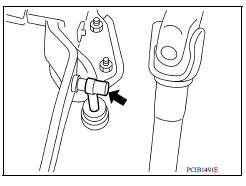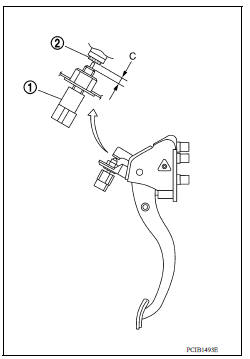Nissan Versa (N17): Clutch pedal
Inspection and Adjustment
1. Check to see if the master cylinder rod end moves freely. It should not be bound by the clutch pedal.
a. If the rod end does not move freely, remove the rod end and check for deformation or damage on the rod end. Leave the rod end removed for step 2.
2. Check the clutch pedal stroke for free range of movement.
a. With the master cylinder rod end removed, manually move the pedal up and down to determine if it moves freely.
b. If any sticking is noted, replace the clutch pedal assembly. Reverify that the master cylinder rod end moves freely.
3. Adjust clutch interlock switch (1) position so that clearance between clutch pedal (2) and thread end of clutch interlock switch (1), with clutch pedal fully depressed, is within specification (C).

Clearance (C) : 0.74 - 1.96 mm (0.0291 - 0.0772 in)

4. Check the clutch hydraulic system components (clutch master cylinder, clutch operating cylinder, clutch withdrawal lever and clutch release bearing) for sticking or binding.
a. If any sticking or binding is noted, repair or replace the related parts as necessary.
b. If any hydraulic system repair was necessary, bleed the clutch hydraulic system. Refer to CL, "Air Bleeding".
Other materials:
Cleaning exterior
In order to maintain the appearance of your vehicle,
it is important to take proper care of it.
To protect the paint surfaces, please wash your
vehicle as soon as you can:
After a rainfall to prevent possible damage
from acid rain.
After driving on coastal roads.
When contaminants suc ...
Front power window switch
Removal and Installation
REMOVAL
1. Remove front power window and door lock/unlock switch (RH)
finisher assembly using a suitable tool (A).
Pawl
2. Disconnect the harness connector from the front power window and door
lock/unlock switch (RH).
3. Separate front power window and door lock/ ...
Categories
- Manuals Home
- Nissan Versa Owners Manual
- Nissan Versa Service Manual
- Video Guides
- Questions & Answers
- External Resources
- Latest Updates
- Most Popular
- Sitemap
- Search the site
- Privacy Policy
- Contact Us
0.0048

 Precautions
Precautions